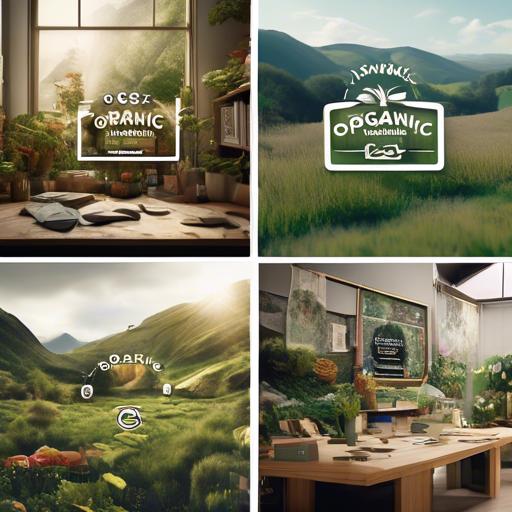Have you ever wondered what those little green badges with the word “organic” on them actually mean? As someone who is conscious about the quality and source of your food, you may have seen these badges pop up on various products in the grocery store. In this article, we will dive into the world of organic certification and explore how you can decipher what these badges actually signify. Get ready to become a more informed consumer and make conscious decisions about the food you put on your plate.
Understanding Organic Badges and Labels
Organic badges and labels play a key role in helping consumers make informed decisions about the products thay buy. These tags are more than just fancy designs on packaging – they signify that the product meets specific standards set by certifying bodies. In a world where terms like “organic,” “natural,” and “sustainable” are thrown around loosely, these badges serve as trusted indicators of a product’s authenticity.
When shopping for organic products, look for the following badges and labels to ensure you’re getting the real deal: USDA Organic: this badge certifies that the product meets the standards set by the united States Department of Agriculture for organic farming practices. EU Organic Logo: This label indicates that the product complies with the organic farming regulations set by the European union. Certified Organic by [Certifying Body]: This badge shows that the product has been verified by a specific certifying body,such as the Soil association or Oregon Tilth.
The Importance of Certifications for Organic Produce
Certifications play a crucial role in ensuring the authenticity and quality of organic produce. When you see those little badges on your fruits and vegetables, you can trust that they have met rigorous standards set by certifying bodies. These certifications not only guarantee that the produce was grown without synthetic pesticides and fertilizers but also ensure that sustainable farming practices were followed.
Organic badges,such as the USDA Organic seal or the Certified Organic logo,serve as a badge of honor for farmers who have dedicated themselves to environmentally amiable farming methods.These certifications provide consumers with peace of mind, knowing that they are supporting a more sustainable and eco-friendly food system. By choosing organic produce,you are not only making a healthier choice for yourself but also supporting farmers who are committed to preserving the planet for future generations.
How to Identify Genuine Organic Badges
When looking for genuine organic badges, it’s important to pay attention to certain details. One way to identify a legitimate organic badge is to look for the certification body or institution that issued it. Certifications from well-known entities such as the USDA Organic seal or the Soil Association are typically reliable indicators of authenticity.
Another way to verify the credibility of an organic badge is to check for specific criteria that must be met in order to display the badge. Look for information on the badge regarding the percentage of organic ingredients, the standards followed, and any additional requirements that the product or company must adhere to in order to receive the certification.
Tips for Shopping for Organic Products
Organic badges can be found on a variety of products in grocery stores, indicating that they have met certain standards for organic certification. When shopping for organic products, it’s important to know what these badges look like and what they mean. Look for labels such as the USDA organic seal, the Non-GMO Project Verified badge, or the Certified Organic logo. These badges signal that the product has been produced without synthetic pesticides, genetically modified organisms, or artificial additives.
Keep in mind that some products may not have a formal organic certification but are still produced using organic methods. In these cases, look for terms like ”natural,” “sustainable,” or “locally sourced” on the packaging. additionally, remember to check the ingredients list for any unfamiliar or concerning additives. By paying attention to these details, you can ensure that you are making environmentally-conscious and healthy choices while shopping for organic products.
Q&A
Q: What are organic badges and why are they important?
A: Organic badges are labels or certifications that indicate a product has been made using natural and sustainable practices. These badges are important because they help consumers make informed decisions about the products they purchase.Q: How can you identify organic badges on products?
A: Organic badges are typically displayed prominently on product packaging. Look for logos or symbols that indicate the product is certified organic.
Q: What are some common organic badges to look out for?
A: Some common organic badges include the USDA Organic seal, the European Union Organic logo, and the Certified Organic logo.
Q: How do companies earn organic badges for their products?
A: Companies must follow strict guidelines and standards set by certifying bodies in order to earn organic badges for their products. This frequently enough involves using organic ingredients and sustainable production practices.Q: What are the benefits of buying products with organic badges?
A: Products with organic badges are typically better for the environment,as they are made using sustainable practices. They are also often healthier for you, as they are free from harmful chemicals and pesticides.
Q: Are organic badges regulated?
A: Yes, organic badges are regulated by certifying bodies that oversee organic standards and ensure that products with organic badges meet these standards.
in Summary
As we conclude our exploration of how organic badges are earned and the importance they hold in the world of organic products, it is clear that these certifications serve as a valuable guide for consumers seeking to make environmentally-conscious purchases.By understanding the rigorous standards and processes behind organic badges, we can make more informed choices that support sustainable practices and promote the well-being of our planet. So next time you spot that familiar green leaf or USDA seal, know that you are not just buying a product – you are supporting a movement towards a healthier and more sustainable future. Let’s continue to celebrate and champion the efforts of organic farmers and producers who are committed to putting the health of people and planet first. thank you for joining us on this journey of discovery. Stay tuned for more insights and updates on all things organic.


